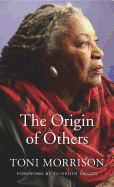
Adapted from a series of lectures she gave in 2016, The Origin of Others showcases Toni Morrison's powerful discussion of race late in her career. Winner of countless awards, including the Nobel Prize, Morrison is firmly established as one of the greatest writers in American literature. Here she examines her own writing and that of others, in an attempt to explain her work in the face of the systemic racism that defines the United States.
Morrison begins The Origin of Others with a story about her childhood, when her great-grandmother commented on the color of Morrison's skin. "These children have been tampered with," the woman claims to Morrison's mother. "My great-grandmother was tar black, and my mother knew precisely what she meant: we, her children... were sullied, not pure." Using the idea of her own racial impurity as a stepping stone, Morrison discusses the false science used to support 19th-century racism, how the othering of blacks serves self-absolution by whites, and how her novels have tried to explore these concepts. While the lecture begins anecdotally, it is much less of a memoir than a treatise, carefully peeling back layers of history and social norms to show deep rot inside American society. It's fitting that the foreword is written by Ta-Nehisi Coates, who has brilliantly taken up the mantle of cultural critic that Morrison has epitomized for so many years. Having him as part of this project underscores Morrison's arguments: that racial concepts from earlier in history are appearing in new forms, and must still be attended to. --Noah Cruickshank, adult engagement manager, the Field Museum, Chicago, Ill.

